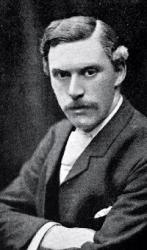
1865 - 1914 Person Name: Charles Silvester Home, 1865-1914 Author of "For the might of Your arm we bless You" in The Irish Presbyterian Hymnbook Charles Silvester Horne (1865–1914) was a famous late 19th century and early 20th century Congregationalist minister, who additionally served as Liberal M.P. for Ipswich, and was a noted orator. He was also the father of the humorous broadcaster, Kenneth Horne.
He was born in Cuckfield, Sussex on 15 April 1865, the youngest child of Charles Horne, the minister of Cuckfield Congregational Church, and his wife, whose maiden name was Harriet Silvester Simpson. When he was six weeks old the family moved to Newport, Shropshire. Here Charles Horne gave up the ministry, becoming the editor of the local newspaper, the Newport Advertiser and became a partner of his wife's uncle, Charles Silvester in a printing and bookselling firm. Horne lived the rest of his childhood in the town, and was educated at Adams' Grammar School, where his headmaster was a Mr. Tom Collins. His father's newspaper was very much a family business, and every member of the family helped with it at some point. The family at this time attended the Newport Congregational Chapel, which is described by Horne's biographer as "The most considerable Nonconformist place of worship in the town." It was through this church that Horne first began to preach, and his thoughts turned towards the Congregational ministry.
He graduated MA from Glasgow University in 1886 and subsequently studied Theology at Mansfield College, Oxford, where he was in the first intake of students at the new Congregational college, before beginning his working life as Minister of Kensington Chapel. During this period he married Katharine, the eldest daughter of Lord Cozens Hardy, Master of the Rolls from 1907 until 1918.
His fame as a preacher and author grew after he took over the Whitefield's Church, Tottenham Court Road, writing hymns which are still sung today. From 1910 until his death he had a national platform for his views as an MP.
In 1914, while on holiday in Canada, returning from Niagara Falls, he was suddenly taken ill travelling on a steamer and died, aged forty-nine, before arriving at Toronto. His body was taken home and buried at Church Stretton, Shropshire, in the cemetery at Cunnery Road. Tributes poured in and his memorial service was attended by David Lloyd George. His wife and children were to outlive him by over half a century, his youngest daughter living until 1984. One of his grandchildren, Archibald Ronald McDonald Gordon, was Bishop of Portsmouth from 1975 to 1984.
--en.wikipedia.org/wiki/S
Charles Silvester Horne


 My Starred Hymns
My Starred Hymns




